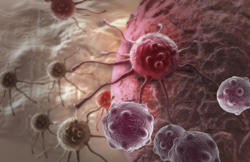PI 3-kinase signalling in cancer
Signalling through PI3K proteins is implicated in cancer development and inhibitors against one or more PI3K isoforms are currently in phase I trials as anti-cancer therapy. However, mammals have 8 isoforms of PI3K, and in order to overcome systemic toxicity of broad-spectrum PI3K inhibitors, researchers consider that therapeutic interference may have to occur at individual isoforms. Based on this, the EU-funded 'Roles of class I PI 3-kinase isoforms in signalling and cancer' (PI3K / SIGNAL-CANCER) project proposed to investigate the role of the different PI3K isoforms during malignant transformation and unveil the mechanisms of resistance to PI3K inhibitors. Following the treatment of cells with classical PI3K inhibitors, researchers observed an upregulation of the PI3K C2alpha isoform, suggesting that it could mediate resistance to PI3K inhibition. As a result, they decided to investigate this further and developed a mouse model where the PI3K C2alpha gene was fully or partially inactivated. Animals homozygous for this kinase-dead PI3K C2alpha gene died during embryonic life, while heterozygous PI3K C2alpha mice showed resistance to the energy-regulating hormone leptin. This was due to a primary defect in leptin signalling in the hypothalamus, resulting in age-dependent obesity and glucose intolerance. In particular, PI3K C2alpha inactivation affected leptin action and glucose homeostasis in the ageing heart, while insulin signalling remained unaffected in the liver, skeletal muscle and adipose tissue. Collectively, the findings of the PI3K / SIGNAL-CANCER study provided a novel view on the role of the PI3K C2alpha isoform in insulin signalling. Although delineation of the mechanisms by which this particular isoform impacts global PI3K activity is pending, the generated tools could help understand the resistance to PI3K inhibitors.







